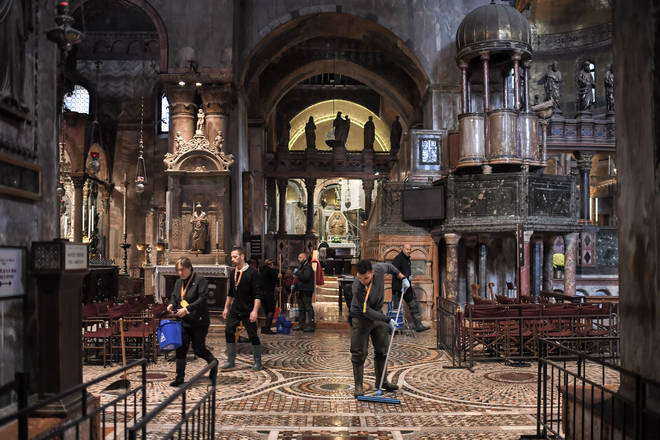Claudio Giovanni Antonio Monteverdi (1567–1643) was an Italian composer, string player and choirmaster. A composer of both secular and sacred music, and a pioneer in the development of opera, he is considered a crucial transitional figure between the Renaissance and the Baroque periods of music history.
Born in Cremona, where he undertook his first musical studies and compositions, Monteverdi developed his career first at the court of Mantua (c. 1590–1613) and then until his death in the Republic of Venice where he was maestro di capella at the basilica of San Marco. His surviving letters give insight into the life of a professional musician in Italy of the period, including problems of income, patronage and politics.
Much of Monteverdi's output, including many stage works, has been lost. His surviving music includes nine books of madrigals, large-scale sacred works such as his Vespro della Beata Vergine (Vespers) of 1610, and three complete operas. His opera L'Orfeo (1607) is the earliest of the genre still widely performed; towards the end of his life he wrote works for the commercial theatre in Venice, including Il ritorno d'Ulisse in patria and L'incoronazione di Poppea.
While he worked extensively in the tradition of earlier Renaissance polyphony, such as in his madrigals, he undertook great developments in form and melody, and began to employ the basso continuo technique, distinctive of the Baroque. No stranger to controversy, he defended his sometimes novel techniques as elements of a seconda pratica, contrasting with the more orthodox earlier style which he termed the prima pratica. Largely forgotten during the eighteenth and much of the nineteenth centuries, his works enjoyed a rediscovery around the beginning of the twentieth century. He is now established both as a significant influence in European musical history and as a composer whose works are regularly performed and recorded.
1. L'Orfeo - Toccata (0:00)
2. Il combattimento di Tancredi e Clorinda - Battle Music (1:29)
3. Lamento della Ninfa (3:52)
4. Cruda amarilli (9:50)
5. Cor mio mentre vi miro (12:21)
6. Non si levav'ancor (14:18)
7. Quel augelin che canta (18:28)
8. O primavera, gioventu dell anno (20:26)
9. Il ritorno d'Ulisse in patria - "Di misera regina" (23:28)
10. L'Orfeo - 'Signor, quel'infelice' (33:25)
11. Lamento d'Arianna (41:14)
12. L'Incoronazione di Poppea - "Pur ti miro" (55:44)
13. Tirsi E Clori
I. Allegro [tutti] (1:00:15)
II. Allegretto (1:07:01)
III. Allegro gaio (1:13:31)
14. Vespro della Beata Vergine (1610) *excerpts
1. Deus in adiutorium (1:20:35)
2. Laudate pueri (1:22:52)
It's all about the classical music composers and their works from the last 400 years and much more about music. Hier erfahren Sie alles über die klassischen Komponisten und ihre Meisterwerke der letzten vierhundert Jahre und vieles mehr über Klassische Musik.
Total Pageviews
Showing posts with label Claudio Monteverdi. Show all posts
Showing posts with label Claudio Monteverdi. Show all posts
Saturday, May 4, 2024
Friday, November 15, 2019
Venice floods: St Mark’s Basilica in Venice suffers ...
... ‘significant damage’ with historic tides
By Kyle Macdonald
0
 |  |  |
The historic church, which dates back to 1092, has been swamped with water following the city’s highest tide in 50 years.
St Mark’s Basilica, which has seen music performances from the likes of great Baroque composers Vivaldi, Monteverdi and Gabrieli, has been flooded following high tides which have impacted the entire city of Venice.
Last night saw the highest tide in more than 50 years, peaking at 1.87 metres. Waters swamped the city’s famous canals, flooding squares, houses, shops and the 11th-century Basilica.
People worked through the night to clear water from the historic mosaics that adorn the floor of the building, situated in St Mark’s Square. According to church records, this is the sixth time the building has been flooded in its history.
The Mayor of the city, Luigi Brugnaro, tweeted: “Venice is on its knees. St Mark’s Basilica has suffered serious damage, as have the whole city and the islands.”

Brugnaro blamed the flooding on the effects of climate change and urged protection for the city from rising sea levels.
The floods have so far claimed the lives of two people on the nearby island of Pellestrina. Italy was hit by heavy rainfall on Tuesday, with more wet weather forecast this week.
The Mayor also pledged that the long-delayed MOSE project, designed to protect Venice and the Venetian Lagoon from tides of up to three meters, will be completed. It began in 2003, but has been continually set back by cost overruns, scandals and delays.
Over the centuries the Basilica has been one of the world’s most important places for Baroque music.
As a young man, composer Antonio Vivaldi's was believed to have occasionally played in the Orchestra of St Mark’s.
Baroque composers such as Monteverdi and Gabrieli wrote large-scale religious works for the vast, elaborate building.
Monday, September 1, 2014
Claudio Monteverdi - His Music and His Life
The Italian Claudio Monteverdi has been born in Cremona on May 15, 1567.
In 1590, he became a violinist and singer at the Duke Mantua Castle. 1613, after the duke's death, Monteverdi joined the Venice Mark Cathedrale.
He dedicated his first opera to Duke Mantua, entitled "Favola d'Orfeo" (1607). "L'Arianne" (from 1608), according to tradition, "disappeared". Monteverdi's operas have been in general interest of many other classical composers regarding new arrangements. Carl Orff or Paul Hindemith are two - just to mention them among many others.
Ecclesiastical masterworks, i.e. the "Vespro della Beate Vergine" (1610) or "Scherzi musical a tre voci" (a funny musical for three voices from 1607) have been never forgotten.
Claudio Monteverdi passed away in Venice on November 29, 1643.
Subscribe to:
Comments (Atom)
